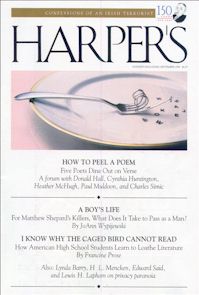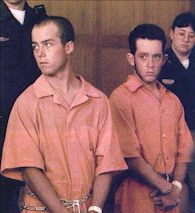 |


|
|
What Does it Take to Pass as a Man?
Author Wypijewski shows how Henderson and McKinney grew into "maturity" in this sick culture. They were Wyoming products and not only because they were straights who happened to hate gays. Laramie's officials—even Wyoming's officials—now want desperately to distance themselves from the murder. In their disingenuous attempts to get Laramie off the hook, they excuse themselves, saying, "This isn't what our town/ state is about." Phooey, says, Wypijewski, quoting county records detailing the area's 'masculine' deportment. Albany County's approximately 30,000 residents were treated—in 1997-98—to nearly 4,000 phone calls for help from women reporting "battering, stalking, sexual assault, and other physical or emotional hurts, almost all committed by men."
The would-be macho's unfortunate fears of showing his feelings, obviously, are near the core of the whole matter. Wypijewski asks: "So what do you do when things hurt?" The "heterosexual" answers: "That's why God created whiskey, don't you think? You get drunker than a pig and hope it drains away—or you go home and cry." "Is that true for most guys?" she persists. "Yeah, pretty much," he replies.
 It is here that Wypijewski strikes hard with perceptions that only experienced women (and some gay men) have:
It is here that Wypijewski strikes hard with perceptions that only experienced women (and some gay men) have:
"So secretly, you're all wusses, and you know you're wusses, but you can't let anyone know, even though you all know you know." "You could say that," the "straight" interviewee agrees. "Can you talk to girls about this stuff?" asks the author. The "heterosexual's" reply is classic: "Unless you know this is the one--like, you're going to get married, and then you're in so deep you can't help yourself--but if not, if you think she might break up with you, then no, because she might tell someone, and then it gets around, and then everyone thinks you're a wuss, unless you are a wuss, and then you know you're a wuss and it doesn't matter." I shared this quote with pioneer Arthur Evans, author of Critique of Patriarchal Reason, and a founder of New York's most effective post-Stonewall gay liberation group. He replied: "Yes, most men are terrified that they're not butch enough. It's a sad situation, and dangerous, too. Historian Lyndal Roper calls this fear 'the fragility of maleness.' She thinks it was a factor in the demonization of women during the witch hunts in Germany: 'Beneath the phallic confidence of sixteenth-century German culture was a distinct awareness of the fragility of male potency and an anxiety about female power, a sexual dynamic which may have more than a little connection with the themes of the witch fantasies.' [Lyndal Roper, Oedipus and The Devil: Witchcraft, Sexuality, and Religion in Early Modern Europe, p. 138.] McKinney wore a kind of drag to enhance his unhappy sense of failed maleness. "Wussitude," says Wypijewski, haunts a Laramie boy's every move and McKinney, surely, was similarly haunted. He was—according to an old roomie-- "a little thing"---and had "tiny arms, a tiny tiny chest, no definition in his body." His drag costume was "gangsta style"—"droopy jeans, baggy shirt, Raider's jacket, gold chains, gold on all his fingers. He'd ape hip hop street talk, but 'he couldn't get it going if he tried.' His nickname was Dopey." Drug use helped McKinney hide—even from himself—his role-conditioned sense of "masculine" shame for his perceived wussiness. He was both a seller and a user. Off of drugs he remained a quiet nobody. But on crystal meth, a pushy little maniac emerged, eager to prove himself a Big Guy. Wypijewski tells how Laramie's unfortunate styles of masculinity came into being; how the Old West, now mythic and long gone, still influences intimate daily life among moderns. By putting Matthew Shepard's murder in this context, she rescues larger questions that men in the West (and elsewhere in America) would otherwise leave happily unanswered. It isn't just a matter of their intolerance for gays, she explains. It's culturally imposed ideas of manliness that are greatly to blame. Gay males and women, straight or gay, pay the awful price. Thank you, Harper's and JoAnn Wypijewski.  Jack Nichols, GayToday's Senior Editor, is author of The Gay Agenda: Talking
Back to the Fundamentalists (Prometheus Books, Inc.) GayToday's readers may order this cloth-bound book for $18.87, a 30% discount off of the regular price of $24.95.
Jack Nichols, GayToday's Senior Editor, is author of The Gay Agenda: Talking
Back to the Fundamentalists (Prometheus Books, Inc.) GayToday's readers may order this cloth-bound book for $18.87, a 30% discount off of the regular price of $24.95.Of The Gay Agenda, John Loughery, author of the award-winning 20th century history classic, The Other Side of Silence, said: "With all the passion of his heroes, Walt Whitman and Thomas Paine, Nichols is the individual with a wide view, grounded in both literature and activism. He not only talks back to the fundamentalists, he talks back to us…above all about the dignity of our struggle." To Order: Call Prometheus Books 1-800-421-0351 Mention GayToday for the discount. |
 © 1997-99 BEI
© 1997-99 BEI
 Accused murderers of Matthew Shepard: Russell Henderson and Aaron McKinney
Accused murderers of Matthew Shepard: Russell Henderson and Aaron McKinney